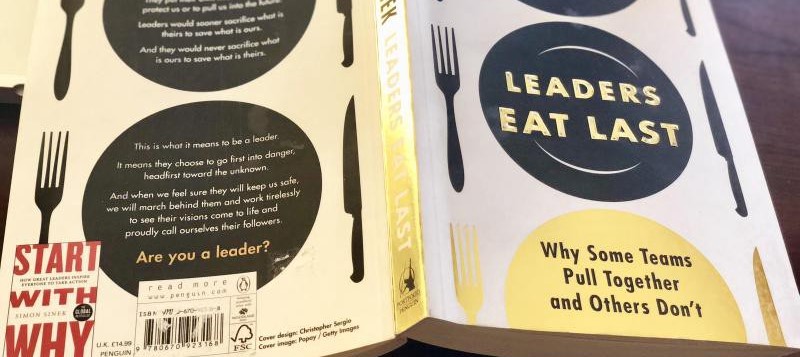Wisdom can be found most anywhere, if you just look. Particularly so if you’re like me, and revel in the unexpected linkages between all sorts of things.
Not long ago I was doing some research on an area nonprofit, which meant learning as much as possible about their leadership. Which in turn led me to a TulsaPeople interview with their CEO, where he talks about the book he re-reads every year: “Leaders Eat Last” by Simon Sinek.
This is a very approachable book, with solid lessons for new and seasoned leaders alike. The title comes from the U.S. Marine ethos of every soldier trusting implicitly that his fellows have his back, they have his, and that their leaders make sure all their needs are met before they themselves sit down at mess. Sinek ties it back to both our evolutionary human behaviors, and tribal behaviors (the Circle of Safety) that co-evolved with us. We were a part of a larger unit, the tribe, from our earliest days and our chemical responses to fight, flight, inclusion, stress, and love still play out in us daily: injecting endorphins, dopamine, seratonin, and oxytocin into our bloodstreams to govern our behaviors and responses to life.
The problem? Our modern corporate structure has evolved away from treating all one’s employees as part of the same tribe (lifelong membership, pre-1981 corporations), and most organizations and individuals suffer from it.
Sinek offers examples of good organizations that care for their employees, and their employees care for the organization right back (James Sinegal, founder of Costco). Conversely, he points out many organizations and leaders who embody the short-term, maximizing shareholder value approach (Jack Welch, GE) which is only now starting to be discredited as a detriment to long-term corporate success.
For all the praise, I would have to say the first three quarters of this book is better than the last. So many nonfiction authors have this problem, where the author hits his talking points and perhaps has trouble tying it all together for a unified conclusion.
In reading “Leaders Eat Last” and “The Good Ancestor,” I’m beginning to sow the mental seeds of a new model of corporate stewardship that aligns North American Indigenous tribal values with a kinder, gentler capitalism. In example, here in Oklahoma the Cherokee Nation Businesses have a number of subsidiaries that all, in the end, reinvest profits into the Cherokee Nation to stabilize communities and encourage growth, which provide resources to tribal citizens. One cannot be laid off or RIFfed from one’s tribe, so there is a psychological safety net that cannot be said of most corporate employment practices.
Many societies around the world offer something similar to the Iroquois “Seven Generations Out” concept, which might curtail some of the more destructive, short-termist behaviors of western capitalism. By considering the potential harm our present-day actions might have for our descendants, we might decide not to invest in fossil fuel extraction, for example. Roman Krzarnic calls this Colonizing our Future.
I’ll continue to work on it.
All in all, this is an excellent reminder of the responsibility one has as a leader of his/her team. Frequent readers will perhaps be tired of me saying that I’m a better leader since becoming a parent; and Sinek says as much:
“Being a leader is like being a parent, and the company is like a new family to join, one that will care for us like we are their own in sickness and in health. And if we are successful, our people will take on our company’s name as a sign of the family to which they are loyal.”
